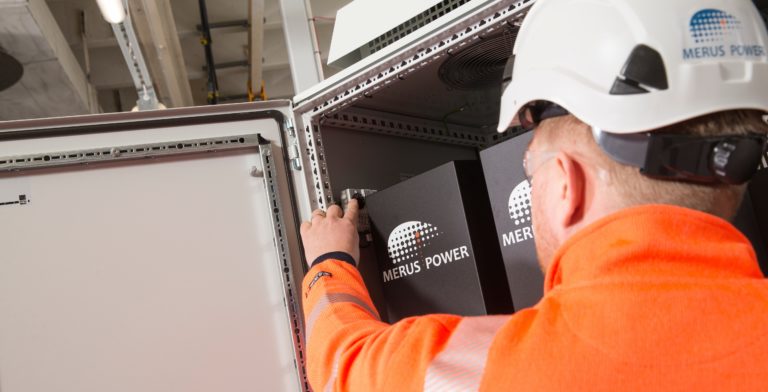
Active or passive harmonic filters: Which solution should you choose?
In the world of electrical systems, managing harmonic distortion is crucial to ensuring efficient and reliable operations. Harmonic filters—both active and passive—are key tools used to mitigate these distortions, but they function in different ways and are suited to different applications. Here’s a breakdown of their differences to help you understand which might be best for your needs.
What are harmonics?
Harmonics are voltage or current distortions that can cause inefficiencies, equipment malfunctions, and even damage to electrical systems. They typically result from non-linear loads, such as Variable Frequency Drives (VFDs), power supplies, and other electronic devices. Harmonic filters are employed to combat these distortions.

Merus® A2 – Active Harmonic Filter
Merus® A2 is a scalable, versatile, and durable active harmonic filtering solution designed and manufactured in Finland using innovative Merus® technology.
Active harmonic filters (AHFs) briefly
- Performance and flexibility: Active harmonic filters are sophisticated devices that dynamically respond to changes in the electrical system. They monitor the system in real-time and inject counter-harmonic currents to cancel out the distortions. This makes them highly effective across a wide range of operating conditions, ensuring that Total Harmonic Distortion (THD) remains within acceptable limits, even under varying loads.
- Installation versatility: One of the key advantages of active harmonic filters is their flexibility in installation. They can be installed at various points in the electrical system—at the point of common coupling (PCC), at the main distribution board, or near sensitive equipment. This flexibility allows for optimal placement depending on the system’s specific needs.
- Power factor improvement: Unlike passive filters, active filters do not contribute to a leading power factor when the system is under no load. This is important because a leading power factor can sometimes lead to overvoltage conditions, which can be harmful to equipment.
Merus Power designs advanced active harmonic filters, our Merus® A2 filter is engineered to deliver exceptional THD control, flexibility, and power factor management for modern electrical systems. Click the link below to learn more about our technology.
Passive harmonic filters (PHFs) in a nutshell
- Simple design: Passive harmonic filters are simpler and typically less expensive than their active counterparts. They consist of inductors, capacitors, and resistors designed to block specific harmonic frequencies from propagating through the system. Passive filters are generally tuned to target particular harmonics, making them suitable for applications with stable, predictable loads.
- Installation constraints: Passive filters must be installed close to the source of the harmonics—typically at each VFD. This can lead to increased installation complexity and cost, especially in systems with multiple VFDs. Additionally, passive filters are less effective when dealing with variable loads, as their performance is optimized for specific conditions.
- Potential for power factor issues: A notable drawback of passive filters is their tendency to cause a leading power factor at no load. This can reduce system efficiency and potentially create challenges in maintaining voltage stability.
Which one should you choose?
The choice between active and passive harmonic filters depends mainly on your specific application needs:
- Choose active harmonic filters if you need a flexible solution that can adapt to varying loads and ensure consistent performance across the system. They are ideal for complex systems with multiple VFDs, where space and installation flexibility are crucial. Check out Merus Power’s Active Harmonic Filter.
- Choose passive harmonic filters if you have a simpler system with predictable loads. Passive filters are best suited for applications with well-defined and stable harmonic levels.
Merus Power also understands that some customers need a solution beyond these two options. For these cases, we offer the Merus® HPQ, a hybrid power quality compensator that combines the strengths of passive and active filters in one compact system.

Merus® A2 – Active Harmonic Filter
Merus® A2 is a scalable, versatile, and durable active harmonic filtering solution designed and manufactured in Finland using innovative Merus® technology.
Merus Power’s active harmonic filter expertise at your service!
Merus Power offers specialized active harmonic filters designed to improve the efficiency and reliability of your electrical systems. Our expertise lies in our proprietary design and technology, which we tailor to your specific needs to effectively reduce Total Harmonic Distortion (THD), ensuring your operations run smoothly and efficiently.
We understand that every application has unique needs, and our team is here to help you select the best active harmonic filtering solution for your business. Focusing on delivering practical and reliable power quality solutions, Merus Power is committed to supporting you with expert advice and tailored solutions.
Conclusion
Harmonic distortion is a significant challenge in modern electrical systems, but choosing the right filtering solution can make all the difference. Active harmonic filters provide superior performance and adaptability, making them ideal for complex and variable systems, while passive filters are better suited for simpler, more stable environments.
By carefully considering your system’s specific needs—such as load variability and installation requirements—you can select the harmonic filter that best aligns with your operational goals.
With Merus Power’s expertise in power quality, you can ensure your system operates efficiently and reliably with the right advanced active harmonic filter tailored to your business.
Ask us about Merus® A2
Do you have any questions?
Please contact one of our salespeople with questions and inquiries.

Riku Kalliomaa
Head of Sales, Active Harmonic Filter
Regions & Channels

Mikko Pohjola
Sales Manager, Active Harmonic Filter,
Key Accounts & OEMs

Viktoria Mansikkala
Sales Manager, Active Harmonic Filter
Baltics & Eastern and Southern Europe

Juhani Jaatinen
Senior Sales Manager,
DACH, Benelux, France, APAC

Venkatesh Ramachandra
Regional Sales Manager,
Middle East
